Vatican: Banning Tintin Book is ‘Politically Correct Lunacy’

A Vatican newspaper has touted the comic book character Tintin as "a Catholic hero".
Relocating a Tintin book to the adult shelves of British bookstores is an example of "politically correct lunacy", says the official Vatican newspaper.
L'Osservatore Romano has hailed the popular character in the book as "a hero of Catholicism" and said it was ridiculous that "Tintin in the Congo" had been "wrapped up like a pornographic magazine and consigned to the adults-only section" of British book shops.
Generally reflecting the views of the Vatican, the newspaper questioned whether the act of censorship - on the grounds that the comic book is racist - was "an appropriate protection of the defenceless children of Her Majesty, or politically correct lunacy in the shadow of Big Ben."
Copies of "Tintin in the Congo" have been moved to adult shelves of British bookstores and publisher Egmont UK are selling the book wrapped in protective packaging complete with a warning label across the front cover because it has been branded racist for its depiction of Africans and contains content that some people "may find offensive."
But a Belgian judicial advisor recently recommended the country's courts reject a legal bid to have the book banned for racism on the grounds that "the representations (of African people) by [author] Herge are a reflection of his time."
An editorial in L'Osservatore Romano agreed, and argued that the comic book reflected the values prevalent in Europe between the wars. "It is essential to take into account the historical context to avoid entering the realm of the ridiculous," the newspaper said.
"The comic book was published in the 1930s, and for that reason expresses the values of the era - but can it really perturb young Britons of today, raised as they are on the Internet, video games and fish and chips?"
The Italian newspaper has even touted Tintin as "an angel" and his curious and adventurous character showed a liking to someone who had "come to earth to defend widows and orphans."
It claims that the indigenous characters featured throughout the Tintin series are never evil, but are instead the "target of the voracity of the evil money makers of multinationals."
The broadsheet's front page story on Tuesday said Tintin was driven by "a sacred moral imperative - to save the innocent and conquer evil."
"Tintin is a Western knight of modern times, an unstained heart in an invulnerable body," it said.
The Italian newspaper did acknowledge that the Tintin comic books represented "the paternalistic clichés of the era in which the Belgians exploited the Congo."
© Copyright IBTimes 2025. All rights reserved.



















